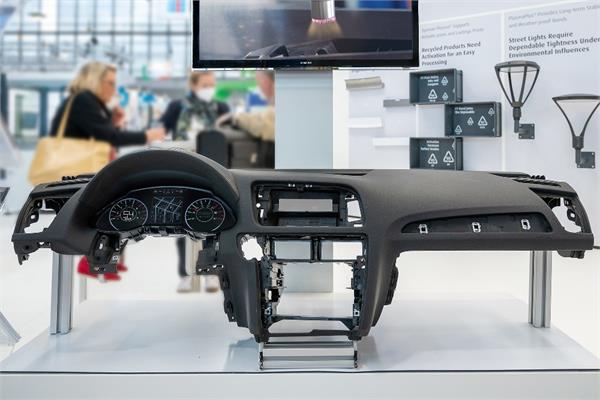
Plasmatreat showcased the CO2-neutral Openair-Plasma process and the cell4_Plasmatreat automation solution.
The Steinhagen-based German company Plasmatreat
GmbH, specialised in atmospheric plasma technology, has showcased its Openair-Plasma processes and the cell4_Plasmatreat automation solution during K 2022 and VDMA Circular Economy Forum, the international events dedicated to the plastics and rubber industry.
Product samples and tools, as well as small batches, individualised items and spare parts can be produced in a very short time using 3D printing. Plasmatreat GmbH demonstrated how the quality of components produced by 3D printing can be significantly improved by its plasma treating solutions, while at the same time reducing the carbon footprint of the manufacturing process itself.
“3D printing alone is not enough. A strong network of manufacturers and companies that master the upstream and downstream processes is key to the breakthrough of this revolutionary technology in the industry. Plasmatreat is taking a step ahead here and shows that solutions can be implemented quickly and sustainably,” has declared Frank Petrolli, the vice-president for the Strategic Market Development of Plasmatreat.
The CO2-neutral Openair-Plasma process
The visitors of the trade fair had the opportunity to experience the CO2-neutral Openair-Plasma process, which significantly improves the product properties of 3D-printed components as well as the process efficiency: activating the surface with Openair-Plasma allows to print and coat without resorting to conventional flame treatment or chemical pre-treatment.
The long-term durability of inks and coatings can also be further increased by a supplementary PlasmaPlus coating. When bonding products from the 3D printer, the use of plasma technology also replaces the use of chemical adhesion promoters (primers) and achieves long-term stable bonds.
The cell4_Plasmatreat automation solution
Plasmatreat has also presented the cell4_Plasmatreat automation solution, developed together with KUKA, using the example of a dashboard printed in 3D technology. The parts were first produced by the 3D printing specialist thinkTEC using HP Multi Jet Fusion technology, that employs a powder bed process. The individual parts have been then subsequently bonded with adhesives from DreiBond GmbH, selectively coated with PlasmaPlus and individually digitally printed.